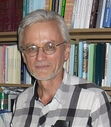Alexander J. Motyl's Blog, page 17
November 14, 2013
Ukraine's President Yanukovych Dithers on EU
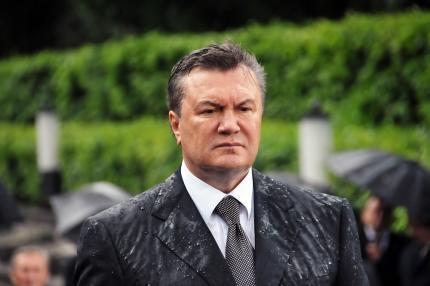
It was sometime this week, as I was reading yet another news item about President Viktor Yanukovych’s continuing unwillingness to make up his mind about the pending Association Agreement with the European Union, that it struck me. I’m awfully tired—and I mean honest-to-goodness, god-awfully tired—of the guy. It’s not that I wish he’d go away (although I do: very much), but that I wish he’d finally make a decision.
No, it’s not even that anymore. I’ve been waiting over two years for him to make up his mind about Ukraine’s integration into Europe. And now, just two weeks before the Vilnius summit that will decide Ukraine’s future, I can no longer listen, watch, or read about the guy. You see, I suffer from Yanukovych Fatigue.
It’s not Ukraine Fatigue: the country and its people remain as interesting as they’ve always been, and I wish them well. Nor is it Regionnaire Fatigue: my feelings toward Yanukovych’s party are better summed up by the term Regionnaire Catarrh. When I see those distinguished gentlemen, I feel the need to clear my throat.
No, it’s good, ol’ fashioned fatigue. Here’s a man who claims to be a Big Decision-Maker, yet he can’t make a decision, even one so obviously in his and his country’s interests. Associating with the EU is a no-brainer. Associating with the Russia-led Customs Union is an equal and opposite no-brainer. But whatever one’s view of either institution, and whatever one’s view of the costs and benefits for Ukraine of associating with the European Union or Russia, a real decision-maker, a real leader, someone with a backbone and a strong will, would have made up his or her own mind long ago. Ya wanna go west? Fine. Go west. Ya wanna go east? Fine. Go east. But don’t abuse people’s patience.
After all, Yanukovych has taken everyone for a long and expensive ride. The Europeans, who have better things to do than to waste their time on tiresome Ukrainian quasi-leaders, must be sick of him. The Russians, who respect strength and will, must wish he’d retire to the Donbas. Ukraine’s oligarchs, who need clarity and stability to run their businesses, must be wondering what made them crazy enough to support his run for the presidency. Yanukovych’s erstwhile south and east Ukrainian supporters know he’s betrayed them by flirting with the EU; Yanukovych’s west and central Ukrainian opponents know he’s betrayed them by dancing around the Association Agreement. Few Ukrainians could have escaped disappointment by now.
In a way, it no longer matters—for Yanukovych, that is—whether Ukraine and Europe sign an Association Agreement or not. His reputation is shot, along with his credibility, and his continual hemming and hawing have disqualified Ukraine’s anti-presidential president from membership in any possible political elite.
Ironically, this is all the more reason for him to go west. A faux-president will always be able to find someone to listen to his stories in Monte Carlo’s famed casinos. Perhaps some faded aristocrat, asthmatic princeling, or pretender to a non-existent throne. In Europe, after all, they have a long tradition of tolerating unserious policymakers who still dream of what might have been. Not so in Russia. There, losers have a tendency to wind up in real or imagined Siberias.
But none of that matters to Yanukovych, whose immaturity, indecisiveness, and lack of professionalism have sabotaged the Association Agreement and driven Ukraine into the wilderness of the developing world. He is isolated from reality, isolated from rationality, and now, thanks to his treatment of Yulia Tymoshenko, he is even isolated from his own country and the world. The irony is inescapable. The man who began his political career in jail as a teenage hoodlum is ending it in a golden cage of his own making.
Photo Credit: Dmytro Larin / Shutterstock.com
OG Image: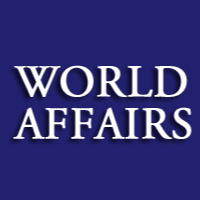
November 8, 2013
A Ukrainian Blogger for Luhansk Mayor?
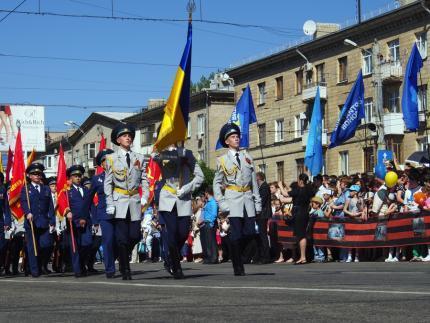
Russian opposition leader Aleksei Navalny may not be the only blogger with a bright political future. Similar prospects could await the “Proctologist,” a critically minded Ukrainian blogger based in the depressed eastern Ukrainian city of Luhansk.
I first reported on the Proctologist—a.k.a. Stanislav Tsikalovsky—in a post on March 30, 2012. At that time, Tsikalovsky was just making a name for himself, especially with a viral video blog in which he stated:
We have no city authorities and no provincial authorities. And it’s not even a question of having no prospects of large-scale change. We have no prospects of any kind of change whatsoever. All that’s left for us, for you, is at a minimum for us, the Donbas, to be enclosed with barbed wire and not be let out, so as not to interfere with normal people’s efforts to develop themselves and build a good country. And at a maximum, I guess, simply to drink ourselves silly.
Tsikalovsky has been going strong, and only getting more popular, since then. His criticism of Luhansk and its corrupt, thuggish, and authoritarian Regionnaire authorities has remained unsparing. They’re easy to lambast and deserve every bit of his ire. Luhansk suffers from a rust-belt economy, collapsing social services, unhealthy living conditions, and a particularly sedentary Regionnaire elite.
As Luhansk journalist Marusia Klymova says about Tsikalovsky’s harsh diagnosis of the city’s many ills:
Slowly but surely the popular blogger is getting invited to television shows as an expert; he’s becoming known [beyond] the Internet … Indeed, the Proctologist was the author of the local saying, “for Luhansk-related reasons,” meaning obtuseness, negligence, disorder, and thievery … He consistently promoted the thesis that Luhansk is the “I City” (or the city of “idiots”)—and we got used to it. Ditto for his suggestion that “napalm” could serve as a universal solvent of the city’s problems. I confess that the stream of negative commentaries about my native city personally upset me … but only until it became clear that this was bitter medicine—and a necessary component of a full-scale information campaign that would proceed from the slogan, “Luhansk is the butt of the world,” to the therapeutic “Luhansk needs the Proctologist!”
Significantly, as Klymova notes, Tsikalovsky has begun proposing solutions to the city’s many problems:
And lo, after several years of destructive criticism of the criminal rule of Serhii Kravchenko (the acting mayor of Luhansk, in case you didn’t know), the Proctologist has suddenly turned to the positive. He’s proposed modern receptacles for cigarette butts. He’s expressed concern for the city’s dying chestnut trees … He’s suggested that there be parking spaces and bike paths for cyclists.
And, last summer, Tsikalovsky announced he had been invited to participate in the city’s reconstruction of Friendship Park. Clearly, the powers that be are out to co-opt him.
If he ever did run for mayor, however, the Proctologist would face not only Regionnaire opposition but also the antediluvian political preferences of the Luhansk population. The city is probably Ukraine’s most pro-Soviet, pro-Communist, pro-Regionnaire, and pro-Russian (in Ukraine, alas, these tendencies generally go together). Voters have solidly voted for the Regionnaires in the last few elections and, when searching for an alternative to express their discontent with Regionnaire misrule, tend to vote for the Stalinist Communists.
Back in March 2012, an interviewer asked Tsikalovsky if he had any plans to run for office. Here’s his response:
I think of it often, but just as often I banish the thought. They won’t elect me because I’ll keep saying that we alone are responsible for our problems. We let them treat us this way. Our people don’t like to hear such things and will reject them. All we want is talk about the Russian language, Russia, and NATO. But we have such politicians in excess.
(For an example of these attitudes, see the Luhansk Communist-sponsored cartoon opposing Ukraine’s association with the European Union.)
Can an electorate such as this ever support the Proctologist? Probably not. But most of Tsikalovsky’s readers and viewers are computer-savvy young people who use, understand, and interact through the social media. They and future cohorts of even more Internet-savvy kids represent Luhansk’s—and, by the way, Ukraine’s—future. The 35-year-old Tsikalovsky is young. So are his supporters. They can wait for the Regionnaires and their acolytes to move on. The Proctologist’s time will come five or ten years from now. And, then, Luhansk might surprise everyone and become a model city.
OG Image: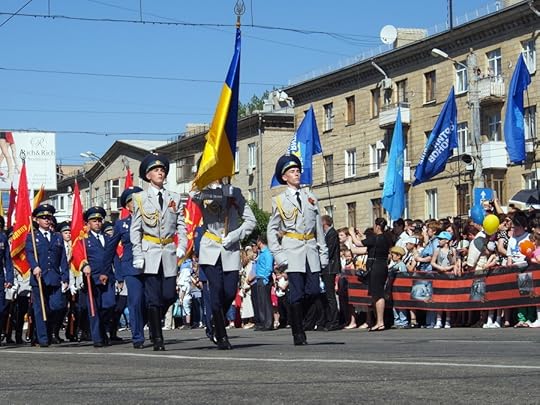
November 5, 2013
Will EU Embrace Ukraine's Membership Bid in Vilnius?
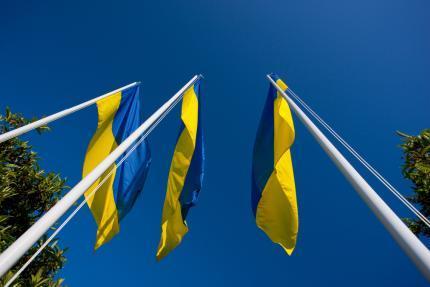
The European Union is often depicted as a feckless, bumbling institution with lots of sex appeal but little capacity to act and talk tough, even when it’s in the EU’s direct interest to do so. As Europe watchers know, the argument is not without merit, especially when Europeans need to consider policy measures that risk alienating influential states.
Here’s a case in point. It’s clearly in the EU’s direct interest to integrate Ukraine through association and accession talks, and it’s clearly in the EU’s interest to do so swiftly and decisively, especially now, as Russia has just ramped up pressure on Ukraine over gas. And yet, Europe appears unwilling to act and talk tough vis-à-vis Moscow, on which it is, to be sure, dependent for gas, even though it would be in its interest to do so. Is such behavior unavoidable?
Not necessarily so, says Jonas Grätz, a researcher with the Global Security Team at the Center for Security Studies in Zurich, Switzerland—and especially when it comes to Russia and Ukraine, where the EU can act decisively and strongly in the very gas sector that many perceive as its weakness.
In a nutshell, Grätz makes the following argument (pdf):
Russia’s and the EU’s development models for their neighborhood diverge increasingly, taking on the character of a zero-sum game. Moscow’s assertive actions against Ukraine have opened a window of opportunity for the EU. The EU should ensure that the Association Agreement with Ukraine will finally be signed at the Vilnius summit [in November]. Yet, the EU has to do more to take the edge off Russian pressure. Ironically, Brussels can do this … exactly where Moscow is deemed strong: in the natural gas sector.
Russian elites want Ukraine because, according to Grätz, “it serves to underpin their own concept of Russia as the center of a ‘civilization’ distinct from the West.” The European Union, meanwhile, needs Ukraine, both because it “is important both as a symbol of its success model of peaceful reform of governance and as a strategic energy hub.” As a result, Europe’s future is directly connected to Ukraine’s:
Ukraine possesses the largest gas transit system and gas storage sites on the European continent, which could well be turned into a vibrant hub for gas trading. Russian control over this vast infrastructure would substantially increase Moscow’s capacities to manipulate vital industries in Ukraine, as well as the liberalized gas market of the EU. Thus, Brussels’ energetic efforts to diversify and reduce its energy dependency, and gain geopolitical freedom of action, stand or fall with Kyiv’s choices.
Grätz’s views on Ukraine’s importance to Russia accord with those of James Sherr, associate fellow of the Russia and Eurasia Program at Chatham House in London (pdf): “Russia will treat Ukraine’s new status [as an associate of the EU] as a threat to its primary interests. Association is more likely to be seen as the start of an accession process than a substitute for it … What matters to Russia is loss of control over Ukraine’s development model.” But the two experts differ in terms of what they believe the EU can do. Sherr prefers that the EU adopt a wait-and-see attitude and places the burden of initiative on Ukraine:
The reality is that Russia will play a role in the process whether it is accorded one or not. The significance of that role will depend in large part upon the strength of Ukraine: the competence of the state authorities, the professionalism of its institutions, and the ability of state and society, pace former President Leonid Kuchma, to “pull together at a crucial moment.” It will also depend upon Ukraine’s standing in Europe. At present, its standing is low, and its state is not fit for purpose. To the extent that Ukraine implements the reforms defined in the Association Agenda, both of these realities will change, and Russia’s opportunities will diminish. Today they are considerable. Threats to the longevity of Russia’s power only magnify Moscow’s incentive to exploit the advantage that it enjoys today. Despite and indeed because of this, the future will also depend upon the ability of the EU to alter its programmatic approach and articulate an ecumenical perspective of its role in Europe.
Calls for an “ecumenical perspective” are policy wonk jargon for doing nothing to alienate or annoy Russia.
Grätz disagrees with this proposal, adopting a more hawkish perspective that derives from his view that relations between Europe and Russia now approximate a “zero-sum game” with clear winners and losers. Grätz therefore argues that, although “signing the Association Agreement is crucial—it will, however, not be a panacea. The EU will have to take concrete measures to curtail Russia’s traditionally strong position in Ukraine’s gas sector. Ironically, it is precisely in the gas sector that the EU is stronger than it thinks—if it plays its cards swiftly and decisively.”
Grätz proposes four steps:
“First, the EU should work swiftly to remove internal obstacles for reverse flow of gas to Ukraine.”
“Second, with the carrot of enhanced supplies in hand, the EU should push Kyiv toward swift implementation of its obligations under the Energy Community Treaty.”
“Third, the EU should give full support to the modernization of Ukraine’s pipeline system, as had been stipulated in 2009. The EU should try to get Gazprom on board—but only as a financial investor.”
“Fourth, the EU and its member states should coordinate with Washington and rapidly conclude the Transatlantic Trade and Investment Partnership. This would make exports of Liquefied Natural Gas from the US possible without further action from the respective governments.”
Grätz’s conclusion shows an important divergence from Sherr’s somewhat qualified observation that “Russia will play a role in the process whether it is accorded one or not.” As the following paragraph makes clear, the EU can, and should, make all the difference in wresting Ukraine from the Kremlin’s sphere of influence, precisely because Ukraine will have to turn toward Russia if Europe chooses to be weak:
Brussels’ structural difficulties in conceiving and implementing a coherent foreign policy are well known; yet, if the EU wants to shape its critical Eastern neighborhood, it has to seize the opportunity and take swift and concrete policy steps. The looming alternative is that Kyiv will have no choice but to bend to Moscow’s pressure. This would lead to a loss of political plurality and to economic instability in Ukraine, and would jeopardize the EU’s energy security. However, the implementation of the four steps detailed above, built on the momentum of a signed Association Agreement, could decisively tip the balance in Brussels’ favor, at a reasonable effort and with acceptable uncertainty. By doing so, the EU would stay in the game, lower the pressure on Ukraine and make a big step toward being a geopolitical power to be reckoned with.
Interestingly, the German analyst Ulrich Speck, a visiting scholar at the Carnegie Europe think tank in Brussels, prefers the views of the Swiss hawk to those of the British dove:
The way the EU asserts its interests and principles in the East in the coming weeks will define its future role in the region. The EU has two main interests in its East. One is long-term stability, which is most likely if the Eastern neighbors move toward the kind of liberal democracy the EU stands for and promotes through the Eastern Partnership.
The other interest is to make Russia understand that it has to accept the full sovereignty of those countries that once took their orders from Moscow. This is first and foremost a matter of principle, as the UN order is based on the sovereignty of states.
But it is also a matter of interest, as Russian interference in its neighborhood often increases tensions. Accepting its external borders as defining the limits of Moscow’s direct influence will help Russia to get past its imperialist history and morph into a modern nation-state that can focus on the overdue rebuilding of its own governance structures.
How will Vladimir Putin respond to an EU decision to stiffen its backbone? With respect, and with grudging acceptance. If there’s one thing the ex-KGB officer trained in the school of tough talk and direct action detests more than President Yanukovych of Ukraine, it’s obsequious Europeans who don’t understand their own strength.
OG Image:
October 25, 2013
Questioning War Monuments
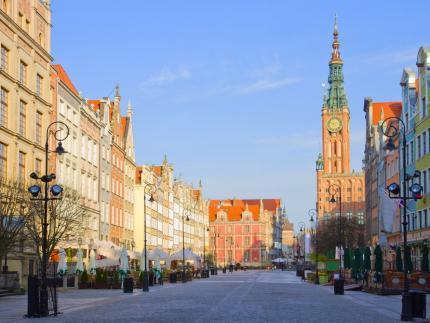
If you think the monument wars in Ukraine take the cake, think again. The Polish city of Gdansk is in the throes of a controversy over a statue of a Red Army soldier raping a woman. It was installed on October 12th, on the city’s Victory Avenue, and uninstalled the next day for having been set up without a legal permit.
Here’s how the Moscow Times reported the brouhaha:
The offending work of art, entitled “Komm Frau,” German for “Come Here Woman,” had been installed on Gdansk’s Avenue of Victory on Saturday. Polish authorities removed the statue on Sunday, saying that it had been put there illegally, while Szumczyk was brought in for questioning by the police before being released, Polish Radio reported.
The sculptor, fifth-year art student Jerzy Szumczyk, said he “was unable to cope” with the accounts he read about rape by Soviet servicemen as they advanced toward Berlin in 1944 and 1945, and felt compelled to express his feelings.
“I am deeply outraged by the stunt by a Gdansk Fine Arts Academy student, who has defiled by his pseudo-art the memory of 600,000 Soviet servicemen who gave their lives in the fight for the freedom and the independence of Poland,” Russian ambassador Alexander Alexeyev said in a statement Tuesday.
“We consider the installation of the statue as an expression of hooliganism, marked by an explicitly blasphemous nature,” Alexeyev said. “The vulgar statue on the city’s main street insults not only the feelings of Russians, but of all clear-headed people who remember to whom they owe their liberation from the Nazis.”
What made Szumczyk’s monument especially disturbing to his critics was its placement—right next to a Soviet T-34 tank intended to symbolize the city’s liberation. The placement was, of course, an intentional provocation. As Szumczyk said: “It’s a work from the heart. The idea came from the fact that the city’s monuments are often in places where they shouldn’t stand. Some monuments don’t fit their surroundings, because great crimes took place there. We barely appreciate what the monuments represent.”
The fact of the matter is that Red Army soldiers representing all the USSR’s many nationalities did engage in systematic mass rape as they swept through the German-populated territories of Hitler’s Reich. Danzig, as Gdansk was then called, was no exception. Here’s how Yale University historian Timothy Snyder describes the violence in Bloodlands:
The outburst of violence against German women was extraordinary. Men who tried to defend daughters or wives were beaten and sometimes killed. The women had few men to protect them…. In some villages, every single female was raped, whatever her age…. Gang rapes were very common. Many women died as a result of wounds sustained during successive rapes. German women often committed suicide, or tried to kill themselves, to prevent rape or to evade the shame of having been raped.
According to the Moscow Times, “Some historians estimate that up to 2 million German women, and large numbers of Polish women, were raped in the final months of World War II by soldiers of the advancing Red Army. However, Russian authorities maintain that the figures are flagrantly exaggerated.”
Imagine that the real number of raped women was only one-fourth of the above estimate. That still comes out to an astoundingly large figure: 500,000. Even one-eighth amounts to 250,000 raped women.
Small wonder that Szumczyk felt impelled to counterbalance the tank with the soldier.
So whom do you believe—the outraged Russian ambassador or the outrageous Polish sculptor? Whose memories matter more? Or perhaps the better question is: whose memories matter?
In placing his statue next to the T-34 tank, Szumczyk was effectively claiming that memories of mass rape were as important as memories of liberation. The sculptor was arguing for parity: yes, there was liberation, he seems to be saying, but there was also enslavement, and both should be remembered. Not so Alexeyev. The Russian ambassador is arguing for priority and, indeed, for exclusivity: there was only liberation and any challenge to that claim is “blasphemous.” Since one generally blasphemes only against God or holy writ, Alexeyev was effectively stating that the Soviet liberation of Poland was a religious matter, beyond memory, beyond history, beyond challenge.
Alexeyev’s views are fully consistent with the Soviet mythmaking that transformed World War II into “The Great Patriotic War,” glorified the Red Army, ignored Soviet crimes, and produced the thousands of war monuments and museums scattered throughout the former USSR. Those myths could stand only as long as Soviet ideological hegemony was unchallenged and the Soviet Union was whole. Once the empire collapsed and the ideology became a shambles, it was—and is—unsurprising that all the empire’s subject peoples should seek to remember their own memories and construct their own histories. For them, the process is liberating and empowering. For many Russians, the process is insulting and diminishing. In succeeding the USSR, the Russian Federation inherited its diplomatic real estate, nuclear weapons, Security Council seat, and space program. But it also had to take possession of Lenin, Stalin, the Gulag, the Great Terror, the Holodomor, and the mass rapes.
It’s no accident that other post-Soviet ambassadors failed to react with Alexeyev’s invective. For them, the collapse of the Soviet Union spelled the emergence of their states. For Alexeyev, collapse probably was, as his boss Vladimir Putin once said, “the greatest geopolitical catastrophe of the 20th century.”
Naturally, all memories qua memories are valid and deserve a hearing. But not all histories are equally valid: some are more complete, some are less complete; some are better, some are worse. And the moral of the story, for Ukraine and other post-Soviet states, is simple: acknowledge all memories and then try to set the historical record straight—or as straight as possible.
OG Image: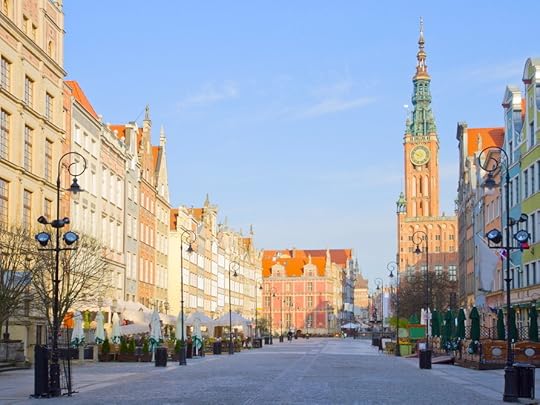
October 21, 2013
Kyiv’s Raiders and Monsters
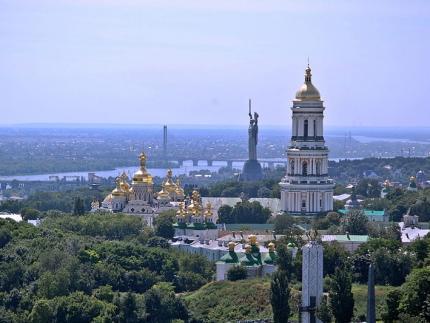
If you’d like to understand the wrenching changes Ukraine’s capital city is currently undergoing, watch for a forthcoming book by Professor Roman Cybriwsky, provisionally titled City of Domes and Demons: Kyiv, Ukraine in Difficult Transition after Socialism. Cybriwsky is an urbanist and former chair of Temple University’s Department of Geography and Urban Studies, former director of Asian Studies, and former associate dean at Temple’s Japan Campus. He has written extensively about New York, Tokyo, Jakarta, Philadelphia, and Phnom Penh and obviously knows his cities.
A tireless walker and fearless interrogator, Cybriwsky combines scholarship with journalism to produce a fascinating portrait of a rapidly changing city that few native Kyivites over 40 would recognize. Back in 1991, when Ukraine became independent, Kyiv was a clean, orderly, provincial, one-horse town. Twenty years later, it’s become a big, chaotic place that’s been fully integrated into the world and suffers from all the problems of large urban agglomerations. Some residents and nonresidents have become fabulously wealthy as a result, many have become impoverished, and all, or almost all, are confused and uncertain about what’s going on around them. The transformation of Kyiv’s Boryspil Airport nicely captures that transformation. Two decades ago, it was smaller, dirtier, and danker than that of some American backwater. Now, it resembles many of the airports in Europe.
One of Cybriwsky’s most interesting chapters concerns the “raiders” attacking Kyiv’s real estate and the new “monster” buildings that have spoiled the city’s traditional feel. Here’s Cybriwsky on the raiders:
In Kyiv and elsewhere in Ukraine, raiders use their muscle and political connections to seize land and buildings from private owners or the commons, as well as industrial establishments and entire industries, and shops, restaurants, hotels, nightclubs and any other kind of business where there is wealth to appropriate. Indeed, almost anyone who is making money at almost any kind of enterprise in Ukraine is a potential target of raiders, including raiders themselves who can find themselves on the losing end to those who are stronger and better connected…. In the first years after the Soviet fall, raiders often used guns or knives to eliminate their rivals, but that happens less now, and many of the raiders who won those duels are now in the government and use government tools to get what they want. For example, they can have their business rivals investigated for tax violations or harassed for violations of building codes, or they can simply have them arrested for something or other until they give up and leave the country.
Cybriwsky provides one example of such raider pressure on a successful “toothpaste” manufacturer (not his real profession) he calls “Ivan”:
It was not long before the raiders started showing up. Hypothetically, one of them wanted to become the toothpaste king of Ukraine, while another wanted to sell everything that was not nailed down and even the land under the building for fast profit. Ivan and the workers were told to hand over the keys, in essence, and get lost, and were threatened. Some people did leave, but Ivan and his wife, who was partner in this venture, and many loyal workers stayed on. Threats worsened. Then, the raider-in-chief arranged for pressure to be put on the enterprise by tax officials, licensing bureaus, and even local fire inspectors on the grounds that there were violations. The local prosecutor investigated him for corruption and dragged his name through the mud in the community, but still Ivan and his loyal circle held on. Ivan’s rivals also threatened his suppliers and his customers, and even made it difficult to hire workers to replace those who had given up and left, as there were threats against any possible new workers. Police and other officials were in the pay of the raiders, so they were no help. In fact, for a period of nearly three years, Ivan and his wife lived in safe houses elsewhere in Ukraine because they felt that their lives were in peril. As a result of all this, the firm makes less toothpaste than it once did, and Ivan, now advanced in years would like to get out. He holds on because of principle and because the workers who had been through hell with him need work, and because there is no one to take over.
The important point is this: “many of the raiders … are now in the government and use government tools to get what they want.” Ruthless real-estate sharks can be found in every country and in every city. When the sharks are in or well connected to government, however, their nefarious influence obviously increases exponentially.
Unsurprisingly for such a lawless environment, the raiders, real-estate moguls, and government bureaucrats with a taste for big bucks can indulge in their wildest get-rich-quick urban fantasies. The result is “monsters,” about which Cybriwsky says the following:
They are mostly high-rises for rich people, and are changing the face of the city. Critics refer to them as monsters because they invade established urban spaces and bring disproportionate change without advance consultation with long-term stakeholders of those places, much less their agreement or approval, and because they often wreak havoc with urban history, historic cityscapes, and the natural environment. Monsters also impose themselves on existing infrastructure such as transportation or parking spaces, and wreak havoc there as well. They are built without reference to any overall city plan, in part because Kyiv does a very poor job of planning where to build, as well as without attention to zoning, in part because Kyiv zones so poorly, but simply appear wherever a developer has acquired access to a wanted site. Often, the construction is on public land: a park or playground, for instance, and proceeds simply because someone in the developer’s pocket has issued papers, however dubious, that authorize construction. It’s all very murky and secretive—a function of collapsed centralized decision-making and document issuance in the Soviet state followed by too long a period of free-for-all chaos ahead of any new order. Corruption calls the shots about land use and construction projects, and monsters rise up wherever they wish.
As Cybriwsky demonstrates, these destructive processes have their roots in Soviet practices, took hold in the crazy 1990s, when all of Ukraine was up for grabs, and continue into the 21st century, under both local and national misrule. It may be some consolation for Kyivites that, as any resident of a large American city knows, greed, shortsightedness, and preference for ugly architecture also characterize non-Ukrainian developers.
Unfortunately, Kyivites bear some of the blame for their city’s woes inasmuch as they elected, twice, as mayor the loony do-nothing millionaire Leonid Chernovetsky, who ignored their needs from 2006 to 2012 and allegedly distributed choice real estate to his family and friends. The Yanukovych regime removed Chernovetsky in the equivalent of a putsch and replaced him with its point man, Oleksandr Popov. Although he’s proven not to be incompetent, the unelected Popov remains highly unpopular with Kyivites, who resent the fact that President Yanukovych’s minions rule the city illegally, having refused to hold elections and calling all the shots.
Fixing Kyiv will probably take decades, but the first step has to be an accountable city government that represents the citizenry and its interests, and not just the fat cats, Regionnaires, and oligarchs. Unsurprisingly, the regime is in no hurry to hold elections. Having violated the law, it knows full well that they could serve to mobilize an outraged population in advance of the presidential ballot of 2015 and possibly doom Yanukovych.
In thinking that Kyiv is just a bigger Donetsk or Luhansk, the Regionnaires made a strategic mistake. It’s anything but. Like Paris, Berlin, Warsaw, and Vienna, Ukraine’s capital is modern and globally savvy. Sooner rather than later, it’ll send the Regionnaire misfits packing.
OG Image:
October 11, 2013
Russia’s Revisionist Claims on Ukraine and Moldova
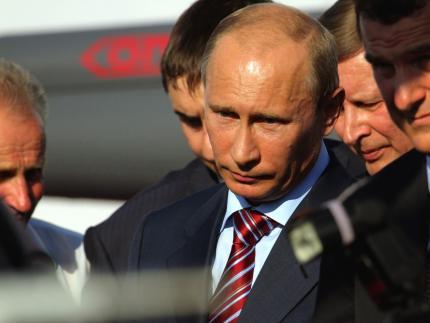
Is President Vladimir Putin readying the rhetorical groundwork for a full-scale attack on international norms regarding the inviolability of borders and state sovereignty? Could be, if the recent comments of two of his closest advisers are any indication of what the Kremlin is thinking.
In early September, Russia’s Deputy Prime Minister Dmitri Rogozin told the Moldovans that Moldova “would lose Transnistria, if Moldova continues moving toward the European Union.” Then, in a sudden onrush of poetic sentiment, Rogozin added: “Moldova’s train en route to Europe would lose its wagons in Transnistria.” Transnistria is the breakaway part of Moldova, sandwiched between Ukraine and the Dniester River, that declared independence in 1990 and enjoys Russian military and diplomatic backing.
Then, later in September, President Putin’s adviser on economic integration, Sergei Glazyev, took part in the 10th annual summit of the Yalta European Strategy, a non-governmental group founded and funded by the westward-leaning Ukrainian oligarch Viktor Pinchuk. Here’s how the Times of London reported Glazyev’s comments:
Russia has threatened to support a partitioning of Ukraine if it signs a landmark co-operation agreement with the European Union in two months’ time. Sergei Glazyev, one of Vladimir Putin’s top advisers, said that Ukraine’s Russian-speaking minority might break up the country in protest at a move that European, Russian, and Ukrainian politicians see as a shift away from Moscow’s influence. He said that Russia would be legally entitled to support them.
Take both sets of comments together and what have you got? A not-too-veiled threat to revise Europe’s postwar borders—in violation, by the way, of United Nations principles and the Helsinki Accords. Significantly, both Rogozin and Glazyev are close to Putin; their sentiments may therefore be interpreted as reflecting his. Until now, the only people who expressed such destabilizing views tended to be loony demagogues such as Vladimir Zhirinovsky. No more. Neo-imperialist, revisionist rhetoric has clearly become mainstream, at least within Putin’s regime.
When I visited Kyiv last summer, a German colleague expressed concern that Russia might stage a provocation in order to annex parts of Ukraine as payback for Kyiv’s pursuit of integration with Europe. As we kicked around possible scenarios, we ended up agreeing that, if such an event were to take place, it would resemble the infamous “Gleiwitz incident,” which served as Adolf Hitler’s pretext to attack Poland. Here’s the Wikipedia account of how the Nazis staged a provocation in the city of Gleiwitz (today’s Gliwice), which lay just to the west of the German Reich’s border with Poland:
On the night of 31 August 1939, a small group of German operatives, dressed in Polish uniforms and led by Naujocks, seized the Gleiwitz station and broadcast a short anti-German message in Polish (sources vary on the content of the message). The Germans’ goal was to make the attack and the broadcast look like the work of anti-German Polish saboteurs. To make the attack seem more convincing, the Germans brought in Franciszek Honiok, a German Silesian known for sympathizing with the Poles, who had been arrested the previous day by the Gestapo. Honiok was dressed to look like a saboteur; then killed by lethal injection, given gunshot wounds, and left dead at the scene, so that he appeared to have been killed while attacking the station. His corpse was subsequently presented as proof of the attack to the police and press.
Change the year to 2014 and the setting to a place such as Sevastopol or Luhansk. Russian secret-police operatives dressed as rabid Ukrainian nationalists and chanting patriotic Ukrainian slogans and waving the blue-and-yellow Ukrainian flag attack some peaceful Russians, perhaps housewives standing in line outside a grocery store. Blood is spilled. A few women lose their lives. The supposed Ukrainians parade their triumph in the streets, threatening to destroy all Russians. (The Soviet secret police, by the way, staged just such provocations in the aftermath of World War II, in its efforts to destroy the Ukrainian underground resistance movement.)
If this happens in Sevastopol, locally based Russian sailors will obviously have no choice but to rush to their compatriots’ defense. If the setting is Luhansk, “spontaneously” formed militias will suddenly appear. Both will claim to be resisting crude violations of human rights by dastardly Ukrainians. They’ll appeal to Moscow for help. Kyiv will appeal to Brussels and the United Nations for intervention. What choice will the Kremlin have but to save its brethren from genocide by fascists? The European Union and the UN will, in the meantime, dither over the meaning of the words they’ll use to express their concern. Luhansk and the Crimea will request annexation by Russia. Moscow, reluctantly, but in full awareness of its sacred commitment to humanity, will agree.
To be sure, both scenarios are premised on a pretty big If, but that If no longer seems all that iffy in light of Rogozin’s and Glazyev’s comments.
The following joke used to make the rounds in Soviet times:
A Frenchman, a Brit, and a Russian are captured by some tribe in Africa and are about to be killed. The chief asks them if they have any last requests. The Frenchman asks for a glass of wine and gets it. The Brit asks for a cigar and gets it. The Russian asks for a punch in the nose and gets in. Thereupon he removes a gun from his pocket and shoots the chief. The Brit and the Frenchman are astounded. “If you had the gun all along,” they say, “why didn’t you use it immediately?” The Russian smiles: “We are never the aggressor.”
In Ukraine and Moldova, they’re not laughing.
OG Image: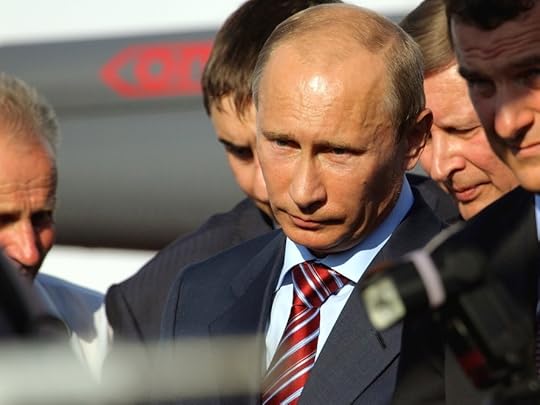
October 8, 2013
The Holodomor Symphony
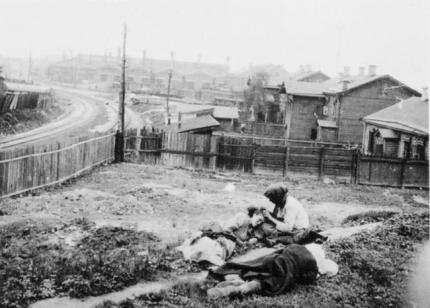
Stephan Maria Karl is a young Austrian composer who is currently writing a symphony about the Holodomor, the famine-genocide of 1932–1933 that took the lives of some 3 to 4 million Ukrainians. He resides in Salzburg. The interview was conducted in German.
How did a young Austrian composer decide to write a symphony about a famine-genocide in Ukraine in 1932–1933?
An artist can inspire the public and get it to question its assumptions, either through the sheer aesthetic force of his work or by means of the self-reflective process that his work induces. And if art can affect the individual, then it can also affect society. An ethically grounded artist who knows this has an obligation to create in full cognizance of the impact his art can have.
As one of the 20th century’s most horrible and internationally least recognized crimes, the Holodomor demands artistic treatment, because it’s imperative both to give voice to justice and truth and to enable Ukraine to deal objectively with its past. Coming to terms with its past is the precondition of Ukraine’s social, economic, and political development, inasmuch as the past, present, and future are inextricably interconnected.
I chose to compose a symphony about the Holodomor because I believe I can make an important, even if modest, contribution to Ukraine’s necessary coming to terms with its own history. Conversations with many Ukrainians in England, France, Canada, and Ukraine have only enhanced my passion. Moreover, I confess to having always been drawn to the Slavic spirit so evident in Slavic art.
Just how can a symphony—or music in general—convey the reality of the Holodomor?
It’s impossible to convey the actual horror of the Holodomor in music. No melody, no sound, no word, and no picture can adequately represent the pain felt by millions. But music can support the process of grieving and, by providing certain impulses and calling forth certain affective associations, enhance the healing that a tragedy requires.
Tell us more about the actual symphony. Is it tonal or atonal? Will it employ words and images? Will there be singing?
The topic of my Ph.D. dissertation, which I’m writing for the Mozarteum University of Salzburg and London’s Guildhall School of Music, is “Synthesis of Tonal and Atonal Sound Structures.” I hope to combine both elements in a dramatically meaningful whole in the symphony. Singing as well as Ukrainian folk melodies will also form an important part of the work.
Are you composing for a Ukrainian audience or for a Western audience?
By using Ukrainian folk melodies, I’m obviously hoping to elicit certain associations in Ukrainian listeners. But it would be an artistic error to make the style of my symphony dependent on the expectations and tastes of the public or of artistic fashion. After all, tastes and fashions are continually changing, while a completed work of art can endure forever. As the Russian composer Sofia Gubaidulina told me in a recent conversation here in Salzburg: “I don’t care whether I’m modern or not. All that matters is the inner truth of my music.”
How have your efforts been received thus far in Austria and in Ukraine?
The Holocaust is a permanent topic of concern in Austria and Germany, inasmuch as it took place right here and was brought about by our ancestors. Soviet crimes are also of great interest to Austria’s educated elite. The Holodomor, on the other hand, is virtually unknown. That’s due less to a lack of interest on the part of Austrians and more to the absence of international recognition.
Most Ukrainians are both surprised by and very supportive of my initiative, especially as I have no Ukrainian roots. All too often, however, I’m also confronted with passivity, lack of interest, suspicion, and rejection by Ukrainians. Equally frustrating are promises of assistance that aren’t kept. As a result, the completion of the project has been delayed, my faith in Ukraine has been shaken, and my motivation needs to be continually replenished. The lack of interest shown by Russians, who have to deal with the many communist crimes in their own country, has never demoralized me.
How do you hope the symphony will affect Ukrainian and other publics?
If my artistic engagement motivates Ukrainian, Russian, and international society to concern itself more with the Holodomor, and in a peaceful, unifying, and liberal—and not hypernationalist—manner, I’d consider that to be a great success.
Do you think Ukrainians and the international community adequately commemorate the Holodomor?
For a historically conscious person who believes in justice, the international community’s ignorance about the Holodomor is as disgraceful as the inadequate coming to terms with other, all too tragically numerous, genocides: Congo, 1886–1908; Armenia, 1915; Soviet Union, 1917–1989; Algeria, 1954–1962; China, 1958–1969; Cambodia, 1975–1979; Ethiopia, 1975–1978; Rwanda, 1994; and Darfur, 2008. And that’s not counting the many hitherto unacknowledged genocides committed by the colonial powers.
The international community’s understanding of the Holodomor might be promoted if Ukraine were to exert permanent pressure on it (as does Poland with respect to the Katyn massacre) and to develop an adequate coming to terms with the issue at home. Ukraine could then serve as a model for Russia and the international community.
It’s been my experience, however, that surprisingly many Ukrainians avoid an intensive confrontation with the Holodomor, be it out of annoyance with history and politics, be it out of fear of the truth and the pain that comes with it, be it out of more quotidian concerns. As a result, the Holodomor elicits fruitless controversies both between Russians and Ukrainians and between Ukrainians themselves. Needless to say, these controversies divert attention from the essential fact that millions of innocents died.
Why do you believe that coming to terms with the Holodomor is important for the continued development of Ukraine?
My interest in the Holodomor is based both on history and on its visible and invisible consequences for today’s Ukraine. The Holodomor, together with the entire period of repression by Russian and Ukrainian Communists, tore apart the Ukrainian spirit. As a result of many years of deprecation, denial, and “enforced” silence, this wound has never healed.
But coming to terms with communist rule in Ukraine shouldn’t just focus on history, the millions of victims, or the condemnation of the guilty. The most important step for Ukraine is to diagnose the psychological, social, economic, and political aftereffects of communism and the Holodomor. If, as J. Willms puts it, a nation consists of “a rich memory on the one hand and the desire to propagate the received heritage on the other,” and if “common experiences of pain are more decisive than joyful memories” for nations, then Ukraine cannot be a full-fledged nation until it absorbs the painful experience of the Holodomor.
How deep are the Ukrainian people’s wounds when, for decades, they were forced to subordinate themselves to the will of the state and to integrate fear and suspicion into their everyday lives? Did this people ever reach the point at which it could no longer distinguish truth from falsehood, justice from injustice, friend from foe? Is it possible for this people to have fallen into a kind of permanent lethargy and cowardice and to have celebrated its own persecutors? Could such behavior somehow be passed on from generation to generation?
There are striking parallels here to the Stockholm Syndrome, whereby victims motivated by self-preservation develop a positive relationship to their persecutors. The same can happen to peoples in despotic states. Unfortunately, a people suffering from such a syndrome is unlikely to change authoritarian structures easily or quickly.
What are your plans for promoting the symphony?
I’d like my symphony to be part of a larger Holodomor Project that includes many other artists, media events, and cultural activities. Unfortunately, I have still to meet anyone who’d like to adopt such an ambitious plan.
By the way, let me suggest a number of activities that could raise international consciousness of the Holodomor: a hunger strike of several days in front of such international institutions as the United Nations, UNESCO, or the European Court of Human Rights (just imagine the greatest hunger strike of all times, one incorporating thousands of Ukrainians during a Ukrainian folk music festival!); public flash mobs; international competitions for film screenplays, music, painting, and theater about the Holodomor; promoting Ph.D.’s about the Holodomor at European universities; establishing a Peace Orchestra consisting of musicians from the former Soviet republics.
Anything you’d like to tell Ukrainians?
Ukraine has been independent now for 22 years. It’s high time for Ukrainians to raise their voice peacefully against its ossified social, economic, and political structures. I wish with all my heart that Ukrainians finally find the confidence in their own ability to act independently. As Edmund Burke said, “All that is necessary for the triumph of evil is that good men do nothing.”
OG Image:

September 27, 2013
The EU Faces Ukrainian Integration and History
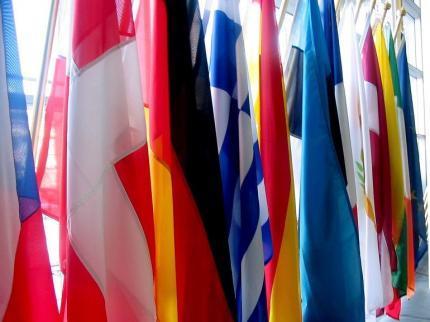
After writing last week’s blog, “Yanukovych Faces EU Integration and History,” I was sorely tempted to write this week’s first draft by simply taking last week’s text and substituting “European Union” wherever “Yanukovych” occurred. Now, now, you might say, that’s no way to treat Europe, which, as everyone knows, is the most “decent, liberal, democratic, stable, and prosperous community” (my words from the blog) in world history. After all, these modifiers don’t exactly spring to mind when one thinks of Ukraine’s president. Indeed, you might say their opposites do.
Personally, I like Europe: I travel there all the time, study the place, read its literature, and admire its cultures and languages. But—and there is always a “but” after such a grand opening statement—I have no illusions about the European Union. Although it’s definitely a “decent, liberal, democratic, stable, and prosperous community,” I’m not at all sure it represents, as Lenin might have put it, the “highest stage” in human development. The EU, as anyone who’s been to the place knows, is profoundly flawed.
The ongoing crisis in Greece and a few other countries is only the tip of the iceberg. The EU has shown a remarkable capacity to avoid making important decisions—in no small measure due to its cumbersome decisionmaking rules—and an equally remarkable tendency to rush headlong into world-changing decisions (the fateful introduction of the Euro in 2002 and the 10-country expansion of the EU in 2004 being just two examples). The EU suffers from a “democratic deficit” that has turned many of its own citizens against it. It meddles in everyday life, while lacking anything resembling a strategic vision. And, finally, it and its member states routinely sacrifice the “European values” that supposedly lie at the core of the entire European project on the altar of crude self-interest. A case in point is Europe’s relations with Vladimir Putin’s fascistoid Russia. Were Europeans—and especially Germans—motivated solely by the lofty ideals of their founding documents, they would have broken off relations with the Kremlin years ago. Instead, those relations thrive.
As hypocritical as that is, it’s also perfectly understandable. Despite the rhetoric, all states, all international organizations, and all do-gooding NGOs are motivated by both ideals and self-interest. As well they should be. If human rights and other moral absolutes determined all foreign policy, no one would be on speaking terms with anyone, and the world would not be a better place.
Which brings me to Ukraine, of course, and the question of whether the European Union should sign an Association Agreement with President Yanukovych. The answer is yes, precisely because the EU has been, is, and should be motivated by both human rights and self-interest.
Ask yourself this question: Will the human and civil rights of Ukraine’s 40 million–plus citizens be better off with or without the agreement, inside or outside the EU’s front yard? The answer should be obvious. The agreement will provide Ukrainians with a certain cover, a shield against the predations of the Yanukovych regime. No agreement, in contrast, will mean both the absence of such a shield and, far worse, Ukraine’s likely drift into the Putin-dominated Customs Union, where human and civil rights are violated as a matter of course.
Is Yanukovych Ukraine’s association with Europe the best possible outcome for human rights? Of course not. That would be a democratic Ukraine’s association with a democratic Europe. But not only is the best the enemy of the good, but the second best is good enough. A few weeks ago, Ukraine’s LGBT organizations wrote to Brussels, asking that Europe’s visa regime with Ukraine not be liberalized until Ukrainian law guarantees all rights to the LGBT community, on the grounds that opposition to sexual discrimination is an “absolute imperative” of EU laws.
Beware of blithe invocations of absolute imperatives that privilege human rights over humans. According to the absolutist logic of this appeal, no one—including Ukraine’s gays—should have the right to travel more easily to Europe until everyone—including Ukraine’s gays—enjoy full protection against discrimination. Extend that logic to the Association Agreement and you must conclude that it’s better for Ukraine to be consigned to Yanukovych’s authoritarianism and Putin’s despotic bloc than to be associated with Europe, because Ukraine is not yet fully democratic. If that makes sense to you, please consider cutting off your nose to spite your face …
Or consider Yulia Tymoshenko, Ukraine’s most prominent political prisoner. Should she be freed as a condition of the agreement’s being signed? According to the “absolute imperative,” yes. Will she be freer if the agreement is not signed? Hell, no. Unsurprisingly, Tymoshenko supports the agreement. Among other things, she knows quite well that her fate, like Ukraine’s, is likely to be far rosier if Brussels has some leverage with Kyiv than if Moscow calls all the shots.
How about self-interest? It’s obvious that Ukraine would benefit from an Association Agreement, but would Europe? Once again, the answer is yes.
First, thanks to Vladimir Putin’s aggressive neo-imperialism, it’s become perfectly clear that failure to sign the agreement will mean that Ukraine will be swallowed up by Russia or the Customs Union, or both. By upping the ante and revealing his intentions, Putin has done everyone, and especially Europe, a great service. One can’t pretend any longer that Ukraine will somehow muddle through without the agreement. It won’t. Europe’s self-interest in all this is obvious. If it feeds Ukraine to Putin, it will encourage an aggressive Kremlin foreign policy that will have immediate destabilizing consequences for the security of the EU’s easternmost members—Estonia, Latvia, Lithuania, Poland, Slovakia, Romania, and Bulgaria. So if you want to destabilize the EU, keep Ukraine out. It’s that simple.
Second, irrespective of Putin’s designs, having a big, geostrategically pivotal state with enormous economic potential on the EU’s side is obviously good for the EU’s security and, in time, prosperity. There is no scenario in which Ukraine’s progressive transformation into Europe’s Zimbabwe could be good for Europe. In contrast, an increasingly “decent, liberal, democratic, stable, and prosperous” Ukraine can only enhance Europe’s own security, stability, prosperity, as well as decency, liberality, and democracy.
In sum, Europe is facing history as much as Yanukovych is. So let me put the case for human rights and self-interest in a way that Europeans—and especially Germans—may immediately understand. If they want to continue sipping their cappuccinos in peace and quiet, they’ll take a moment to look up from their smartphones, stare history in the face, and permit imperfect Ukrainians inside their cafes.
OG Image:
September 23, 2013
Yanukovych Faces EU Integration and History
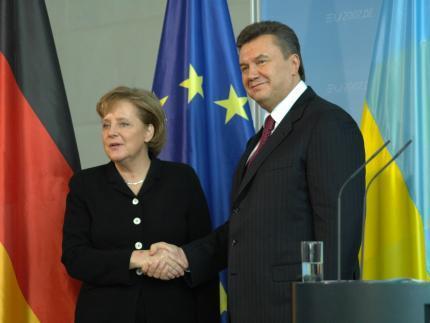
It’s not every day that a president gets to look history in the eye. It’s not every day that a leader has to make a choice that will determine both his country’s trajectory and his own legacy for decades, perhaps even for centuries. Most leaders at most times just muddle through their years of rule and end up as footnotes or failures in subsequent historical accounts. Many make the wrong fateful choice and thereby doom themselves to infamy and their countries to disaster. Only few—usually the exceptional leaders—make the right fateful choices.
Given the profoundly unexceptional nature of Viktor Yanukovych’s presidency, he has no right to stand face to face with history. He’s no George Washington. He’s no Charles de Gaulle. He’s no Margaret Thatcher. Heck, he’s not even Jimmy Carter. And yet, history, like the Lord, moves in mysterious ways, and, lo and behold, it’s Yanukovych who, of all people, is in the unique, and uniquely unlikely, position of being able to propel Ukraine into the world.
Nothing in Yanukovych’s past suggests that he should be even remotely interested in Ukraine’s integration into Europe and eventual membership in the European Union. Ukraine’s current president is the product of one of the most Soviet, most Communist, least Western, least European, and least Ukrainian regions in the entire Soviet Union. He should be looking east. Instead—mirabile dictu—he’s looking west.
Two years ago, when Yanukovych first intimated that he’d pursue EU integration, it seemed like a bad joke or a sly ruse. Now, just a few short weeks before a November summit in Vilnius is supposed to decide whether Ukraine gets to sign an Association Agreement with the European Union, Yanukovych’s continued commitment to integration seems to be genuine. Indeed, it’s now conceivable that Yanukovych could pull off a Nixon. Just as it took a lifelong anti-Communist to pursue rapprochement with China and end the war in Vietnam, so too it may take a lifelong pro-Russian politician to move Ukraine out of Russia’s sphere of influence and into Europe’s.
It’s highly unlikely that Yanukovych and his entourage care greatly about the Ukrainian population’s global integration or about European values. But they understand full well that moving toward Russia and joining the Moscow-led Customs Union means subordinating themselves to Vladimir Putin’s fascistoid regime, and subordinating their wealth, as well as that of Ukraine’s oligarchs, to the far larger capital resources of Russia’s superrich. Simply put, integrating with Russia means being transformed into the impotent vassals of an underdeveloped thuggish state. In contrast, EU integration means subordinating themselves to the EU’s light political touch and inconsistently implemented values, a legal system that won’t encroach upon their ill-gotten wealth, and a civilized form of capitalism that is structured according to rules that Ukrainian oligarchs have long since mastered.
Notwithstanding Yanukovych’s motives for pursuing westward integration, it’s actually a great thing for everybody concerned—for Ukrainians, for Europeans, and for Russians.
Ukrainians will benefit from finally becoming part of a decent, liberal, democratic, stable, and prosperous community, whose decency, liberalism, democracy, stability, and prosperity will progressively rub off on Ukraine. Europeans will benefit from finally having an increasingly decent, liberal, democratic, stable, and prosperous country—which also happens to be one of the continent’s largest and geopolitically most important—in their front yard. Russians will benefit from finally having an increasingly decent, liberal, democratic, stable, and prosperous country—which also happens to like Russian language and culture and be unwaveringly supportive of good relations with Russia and Russians—in their back yard.
Unsurprisingly, the only one to kick and shout against Ukraine’s EU integration is Russia’s President Vladimir Putin, and that’s because he’s the only loser. Putin’s legitimacy as a charismatic fascistoid leader rests on his ability to claim that he, and only he, can reestablish the lost empire, reclaim the Soviet golden age, and restore imperial Russia’s place in the sun. None of these promises makes any sense without Ukraine. Seen in this light, the panic, demagoguery, and alarm with which the Putin regime has greeted Ukraine’s moves toward Europe smack of desperation—not so much at the prospect of Ukraine’s becoming increasingly decent, liberal, democratic, and prosperous (after all, what normal leader wouldn’t want all his country’s neighboring states to be like that?) as at the prospect of the Russian regime’s own looming illegitimacy and instability.
As the Vilnius summit approaches, Yanukovych should remember that the choice he makes will determine how history views him. If he stays the course, addresses the Tymoshenko issue, and opts for Europe, history will probably overlook most of his incompetence and underscore his bold Nixonian move, perhaps even calling it a stroke of genius. If he blinks and opts for integration with Russia, history will remember him as a Putin clone and consign both of them to the ash heap of failed dictators.
OG Image: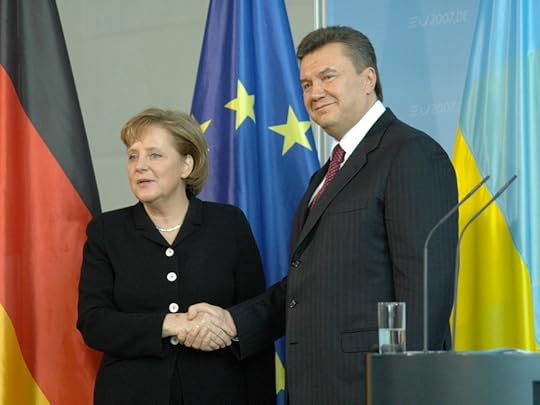
September 11, 2013
Deconstructing Putin on Ukraine
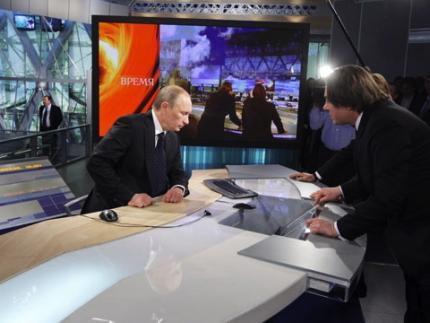
President Vladimir Putin’s September 4th interview with Russian state broadcaster Channel One and the Associated Press cast a bright light on the incompetence of his public relations office and on his own antediluvian notions about Ukraine.
Whoever translated the official Kremlin transcript showed a striking ignorance of the English language—the translation is wooden—and of elementary political-historical terminology. Several sentences stand out, both because the translation is shockingly bad and because, when dissected, they reveal a great deal about Putin’s mind-set.
In response to Channel One correspondent Kirill Kleymenov’s question about Russia’s relations with Ukraine, Putin says the following (my translation from the Russian): “You know, regardless of what happens and where Ukraine goes, we will still meet sometime and somewhere. Why? Because we are one people.” Here’s the official English translation: “You know, no matter what happens, and wherever Ukraine goes, anyway we shall meet sometime and somewhere. Why? Because we are one nation.”
Putin explicitly says “people” (narod), and not “nation” (natsia). As an ex-KGB officer well-schooled in Leninist dialectics and Stalinist nationality policy, he knows that the Russian and Ukrainian nations cannot constitute a nation. But they might constitute a “people,” a lower-level, ethno-cultural agglomeration that doesn’t have all the objective characteristics of a nation as defined by Stalin in 1913. Back in Soviet days, Russians, Ukrainians, and all the other nations were supposed to be “drawing together” to form a “new community of people”—the “Soviet people.” Since the language and culture of the Soviet people were essentially Russian, non-Russian dissident critics of Soviet policy argued, not incorrectly, that the Soviet people was just a smokescreen for a policy practiced by the czars—Russification.
Putin is not only drawing inspiration from Soviet theory and practice, he is also explicitly basing his views on those of Russia’s reactionary czarist forces. As he told Kleymenov in reference to the bloody Civil War between anti-Bolsheviks and Bolsheviks in 1918–1921 (according to the official translation): “Both the White movement and the Red one were fighting against each other to death, millions of people died during the civil war, but they never raised the issue of separation of Ukraine. Both the Reds and the Whites proceeded from the integrity of the Russian state.” Indeed, they did. Some left-leaning Sovietologists used to insist that Lenin and the Bolsheviks supported the liberation struggles of the non-Russian nations, but Putin is quite right to say that the only thing the Reds had in common with the Whites was the continued maintenance of the Russian imperial state.
The line immediately following the one ending with “from the integrity of the Russian state” is especially revealing. My literal translation from the Russian reads as follows: “As far as this part, Ukraine, is concerned, it is a land and we understand and remember that we were born, as I said, within a common Ukrainian Dnipro [River] baptismal font, Rus’ was born there, and we all come from there.” Putin’s translator wrote the following: “As far as this part of Ukraine is concerned, it is a territory and we understand and remember that we were born, as I said, from the unified Ukrainian Dnieper baptistery, Russia was born there and we all come from there.”
The nuances require some elucidation. First, it’s clear from the grammatical structure of the above two sentences that Putin is saying “As far as this part [of the Russian state], Ukraine, is concerned” and not “As far as this part of Ukraine is concerned.” Willfully or not, Putin is claiming that Ukraine is a part of the Russian state. His translator kindly removed that undiplomatic sentiment from the English version.
Second, Putin says Ukraine is a “krai”—purposely avoiding the Russian word for country, strana. I’ve translated it as “land”—which is the way it frequently appears in patriotic Russian verse or songs—while the translator prefers “territory,” which, while more prosaic, also conveys the non-state quality of Ukraine. Either way, Putin comes across as believing that Ukraine is just a place, populated by people who resemble Russians, and not an independent state with a national identity of its own.
Finally, Putin knows that the state whose capital was ancient Kyiv and which adopted Christianity 1,025 years ago was known as Rus’. As a Soviet-era apparatchik, he would never have called it Russia, as the translator did (and as some historically challenged Western scholars still do), although he obviously believes that, inasmuch as Russians were “born” there, so too Russia, the state, must be able to trace its lineage to that political entity. (By the way, the Russian version of Russia—Rossiya—shows that Russia’s seeming terminological derivation from Rus’ is apparent only in English.) While many Ukrainians also trace the lineage of their statehood to Rus’, the fact of the matter is that Rus’ is to Ukraine and Russia as ancient Rome is to Italy and France. While all four countries can trace their roots to their respective big states, none can claim to be identical with them, even though Italy and Ukraine can insist on some geographic priority by virtue of having the same capitals as those states.
By the same token, even though the French and the Italians can trace their origins to the “baptismal font” in ancient Rome, no one would suggest that they are therefore the same people or the same nation. Nor would the French claim that Italy is a borderland or territory of France.
So what’s the bottom line? Putin should fire his translators for making him sound like a wild-eyed Russian chauvinist. He’s not. He’s just a run-of-the-mill neo-Red, neo-White neo-imperialist.
OG Image: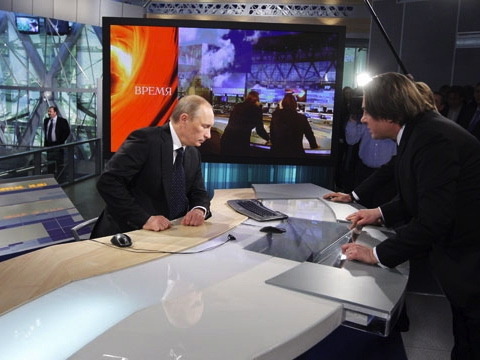
Alexander J. Motyl's Blog
- Alexander J. Motyl's profile
- 21 followers


